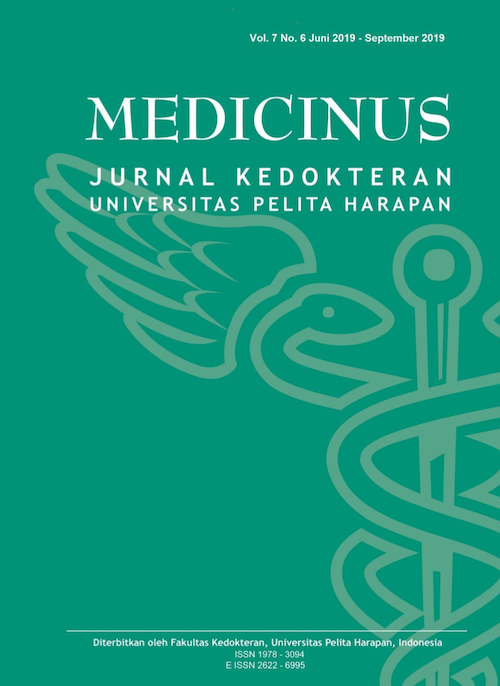The Relationship between AAS (Addiction Admission Scale) and APS (Addiction Potential Scale) with Timely Graduation of UPH Medical Faculty Students
DOI:
https://doi.org/10.19166/med.v7i6.2594Keywords:
MMPI-2, Addiction, On time graduation, Addiction Admission Scale, Addiction Potential ScaleAbstract
Background: Addiction influential to neurotransmitter damage in the brain, resulting in physical fatigue and behavioral changes that will affect the length of studies of students. The MMPI-2 questionnaire is an instrument used to assess the Addiction Admission Scale / AAS and Addiction Potential Scale / APS.
Objective: This study looks at the relationship between AAS and APS with the timely graduation of students.
Methods: The study design of this research was cross-sectional for students of the Faculty of Medicine who were running a co-ass program at the Dharmawangsa Mental Hospital and had carried out the MMPI-2 test. Data analysis was done using Stata IC version 16 using t-test, spearman correlation test, and logistic regression.
Results: Of the 81 respondents, 67% of women and 33% of men and students who graduated on time amounted to 79%. T-test results obtained an AAS score in the group that was not on time (mean 2.53 ± 1.37) significantly higher than the group that was on time / study period of 5.5 years (mean 1.27 ± 1.56) with a p value of 0.0035. APS has a significant correlation to AAS with a coefficient value of r of 0.2595 and p value of 0.0201. AAS logistic regression test for the accuracy of graduation has a p value of 0.0067 with an OR value of 1.559 (95% CI 1.09-2.21).
Conclusion: There is a significant relationship between AAS on time graduation and there is no significant relationship between APS with on timely graduation.
References
Carton, S. T., & Goodboy, A. K. 2015. College students’ psychological well-being and interaction involvement in class. Communication Research Reports, 180-184. https://doi.org/10.1080/08824096.2015.1016145
2. E Guthrie, D Black, H Bagalkote, et al. Psychological stress and burnout in medical students: a five-year prospective longitudinal study. J R Soc Med. 1998; 91(5): 237-243. https://doi.org/10.1177/014107689809100502
3. Jelley RB, Parkes MA, Rothstein MG. Personality perceptions of medical school applicants. Med Educ Online 2002; 7:11. https://doi.org/10.3402/meo.v7i.4538
4. Mahbuba NazninSani. Procedia-Social and Behavioral Sciences vol 5, 2010: 498-501. https://doi.org/10.1016/j.sbspro.2010.07.131
5. James N. Butcher, John R. Graham, Yossef S. B. P., et al. MMPI-2 Basic Information. Source: University of Minnesota Press.
6. Hidajat Hubertus Kasan, Ragam MMPI-2 dalam Seminar MMPI-2, Jakarta, 2010 7. Hubungan antara panjangnya waktu kuliah dengan tanggung jawab, kemandirian, dan kekuatan ego mahasiswa di Fakultas Kedokteran, Medicinus Vol. 5 No. 3 Juni-September 2016.
Downloads
Published
How to Cite
Issue
Section
License
Copyright (c) 2020 Engelberta Pardamean, veli sungono

This work is licensed under a Creative Commons Attribution-ShareAlike 4.0 International License.
Authors who publish with this journal agree to the following terms:
1) Authors retain copyright and grant the journal right of first publication with the work simultaneously licensed under a Creative Commons Attribution License (CC-BY-SA 4.0) that allows others to share the work with an acknowledgement of the work's authorship and initial publication in this journal.
2) Authors are able to enter into separate, additional contractual arrangements for the non-exclusive distribution of the journal's published version of the work (e.g., post it to an institutional repository or publish it in a book), with an acknowledgement of its initial publication in this journal.
3) Authors are permitted and encouraged to post their work online (e.g., in institutional repositories or on their website). The final published PDF should be used and bibliographic details that credit the publication in this journal should be included.





